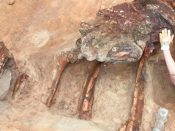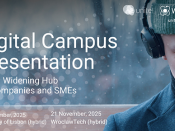Sam Kassegne, PhD, PE
Professor of Mechanical Engineering
MEMS Research Lab, Department of Mechanical Engineering
San Diego State University
For neural applications, materials that are capable of interfacing with the brain and spinal cord without harming them while recording high-fidelity signals over long-term are still sought after. In this talk, we report on a new electrode material fabricated from lithographically patterned glassy carbon (GC) that promises to achieve this by combining superior electrochemical properties for neural recordings and better long-term stability under electrical stimulation than current thin-film metal microelectrodes.
We demonstrate that lithographically patterned glassy carbon microelectrodes can withstand at least 5 million pulses at 0.45mC/cm2 charge density with <7.5% impedance change, have >70% wider electrochemical window and 70% higher CTC (charge transfer capacity) than platinum (Pt) microelectrodes of similar geometry, which delaminated after 1 million pulses. For direct comparisons, ultra-flexible, micro-electrocorticography (μ-ECoG) arrays with GC electrodes were manufactured using recently introduced pattern transfer techniques, while thin-film platinum arrays were fabricated using conventional microfabrication methods. Additionally, poly(3,4-ethylenedioxythiophene)-poly(styrenesulfonate) (PEDOT-PSS) was selectively electrodeposited on both sets of devices to specifically reduce their impedances for smaller diameters (<60μm). We observed that PEDOT-PSS adhered significantly better to GC than Pt, presumably due to stronger interaction between GC and carbonaceous PSS-PEDOT chains, and allowed drastic reduction of electrode size while maintaining same amount of delivered current.
Further, acute in-vivo characterization was performed in rats and it is shown that GC microelectrode arrays recorded somatosensory evoked potentials (SEP) with an almost twice SNR (signal-to-noise ratio) when compared to the Pt ones. Supported by characterizations and computational modeling results, the talk will demonstrate (i) the reason behind long-term corrosion problems in thin-film metal microelectrodes and the promise of homogenous electrode material such as GC and (ii) the microenvironment and response of tissues to long-term electrical stimulations. In this talk, we will also introduce some of the key research activities being carried out at CSNE (Center for Sensorimotor and Neural Engineering), NSF-funded Engineering Research Center with University of Washington, MIT, and San Diego State University (SDSU) as leading institutions.
Dr. Sam Kassegne holds a Ph.D. degree in engineering mechanics from Virginia Tech. His research interests are in the general areas of NeuroMEMS, sensors, and bionanoelectronics. His experimental research work is focused primarily in Carbon-MEMS, new bionanoelectronics platforms, and NeuroMEMS where his group is developing several innovative neural interfaces for Intracortical, epicortical, and spinal cord signal recording and stimulation as part of bi-directional closed-loop brain-computer interface (BBCI) system.
Dr. Kassegne is currently deputy director of NSF funded (~$40 million for 10 years) ERC (Engineering Research Center) on sensorimotor neural engineering. The leading partner institutions are University of Washington and MIT. Dr. Kassegne has an extensive industrial experience in MEMS and other areas acquired through his employment at Nanogen, Microfabrica and Bentley Systems in Southern California. He also has consulted for several companies such as Corning/Intellisense, SAIC, Nevada Nanotech, OxyHeal, Game Changers, Cooley LLP, Nokia, etc. Further, as evidenced by the breadth and depth of his publication records and the companies he has consulted for, Dr. Kassegne has a unique engineering background that spans a number of engineering disciplines. Dr. Kassegne's research has been funded by NSF, DOE, DOD (SPAWAR), CSUPERB, Amco (Korea), etc. He has also taught MEMS & FEA courses at UCSD and UCI where he was a visiting scientist at his mentor's Marc Madou's Lab.





















